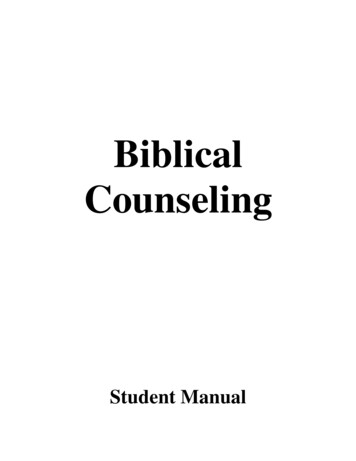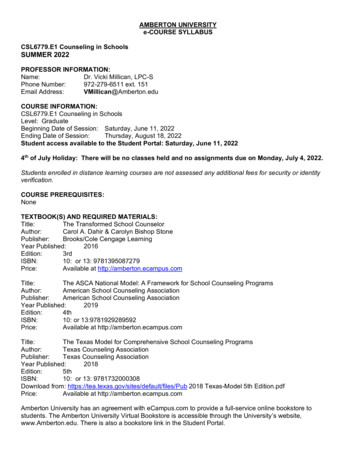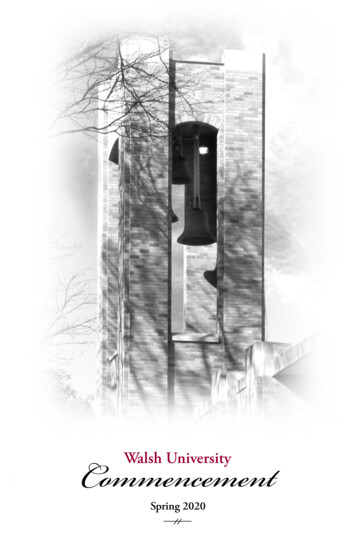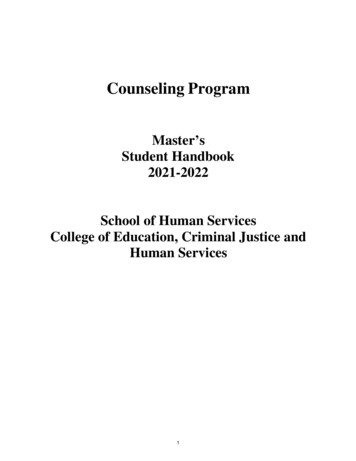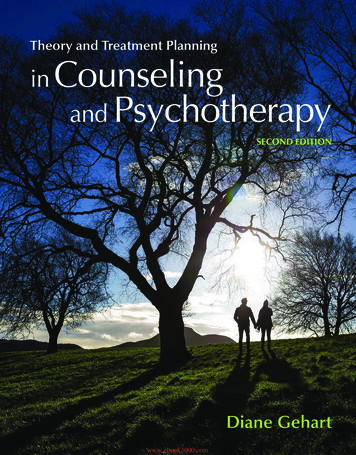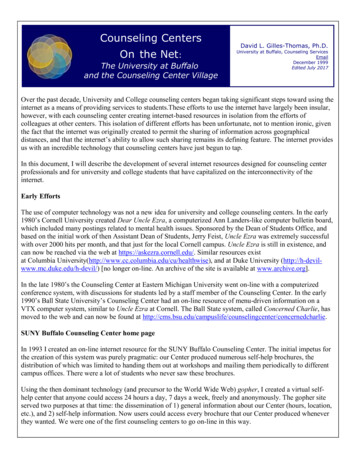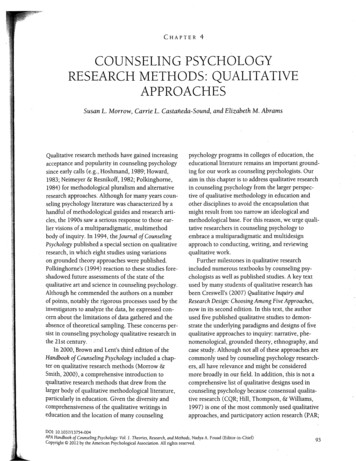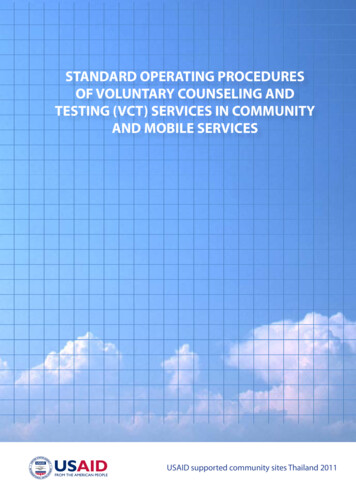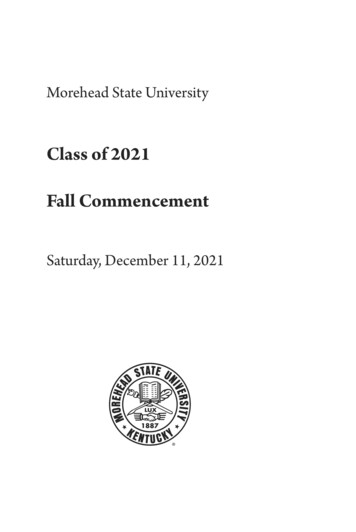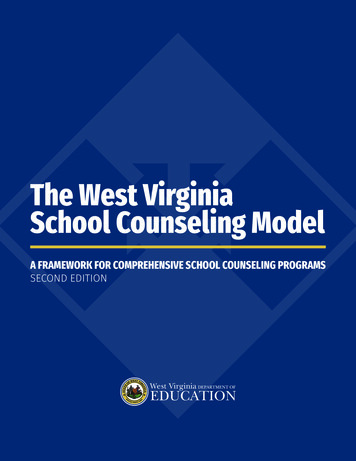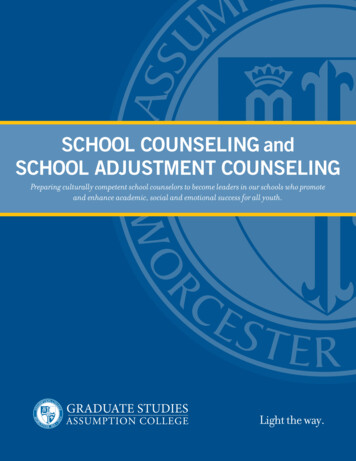
Transcription
SCHOOL COUNSELING andSCHOOL ADJUSTMENT COUNSELINGPreparing culturally competent school counselors to become leaders in our schools who promoteand enhance academic, social and emotional success for all youth.GRADUATE STUDIESLight the way.
“The programcompletelyexceeded myexpectations.”– STEVEN BRUTUS, M.A. ‘12SCHOOL GUIDANCE COUNSELORAUBURN HIGH SCHOOL, AUBURN, MA“I was hired immediately during the summerafter graduation to start as a working schoolcounselor in the fall. The credentials that weearned are unequaled. The program is designedto meet course work and field work standardsfor certification by the NBCC (National Board ofCertified Counselors). Through the NASDTECinterstate agreement, graduates can work in27 states.* There is a consistent emphasis onbringing real world practice into the classroom.To me, it was clear that school districts are wellaware of the knowledge, professionalism, andcounseling expertise which allows Assumptiongraduates to hit the ground running.”* Individual states may have additional requirements1ASSUMPTION COLLEGENATIONAL RECOGNITION One of only three schools in Massachusetts to be“Approved with Distinction” by DESE Recognized as one of the best colleges in the U.S.according to The Princeton Review in its annual“Best 380 Colleges” listing. Ranked in the top tier of U.S. News & World Report’s“2019 Best Colleges” ratings of approximately 200universities in the North that offer bachelor’s andmaster’s degrees.
School Counseling ProgramsMASTER OF ARTS (M.A.)IN SCHOOL COUNSELINGMASTER OF ARTS (M.A.)IN SCHOOL ADJUSTMENTCOUNSELING/SCHOOL SOCIAL WORKFOUR CERTIFICATE OF ADVANCEDGRADUATE STUDY (C.A.G.S.)OPTIONS IN SCHOOL COUNSELING(See information on page 7)School Counselors are uniquely qualified to meet theacademic, career, social, and emotional needs of all studentsby developing, implementing, assessing and maintaining acomprehensive school counseling program that facilitatesstudent success.The comprehensive curriculum at Assumption Collegeprepares students to assume a critical role in maximizingstudent success.Distinctive Advantages to Help Advance Your Career: 100% of our students met or exceeded DESE standardsfor school counselors PreK-8, 5-12, and School AdjustmentCounselors/School Social Workers as rated by theirsupervising practitioners A curriculum that exceeds state and national standardsfor counselors working in a school setting A curriculum that prepares candidates for culturallyresponsive practice in diverse school settings Over 75 quality pre-practicum and clinical practicumplacement sites in urban and suburban school districtsin Massachusetts Class formats and schedules aim to accommodate theneeds of busy individuals Programs approved by the Massachusetts Departmentof Elementary and Secondary Education to license schoolcounselors (Initial Licensure Pre K-8 or 5-12) and SchoolAdjustment Counselors/School Social Workers(Initial Licensure, All Levels) Quarterly Professional development opportunities throughworkshops offered by the Institute for School Counselingand School Psychology Focus on the application of counseling interventionsin school settings Support for students to engage in professionaldevelopment opportunities Curriculum emphases on public policy, leadershipdevelopment, child advocacy and social justice Faculty with extensive school and counseling experienceAs a graduate of the School Counseling Program atAssumption College, you will be fully prepared for acritical role in helping students find academic, social,and emotional success.SUSAN SCULLY-HILL, PH.D., CRCDIRECTOR, SCHOOL COUNSELING PROGRAM2
Assumption Advantages that Make a DifferenceThe Collaborative Learning Environment Empowers candidatesas They Acquire and Master the Knowledge and Skills Criticalfor effective Professional Practice.Candidates in the School Counseling programs engage in cooperative activitieswhere they learn from fellow classmates as much as they learn from theirprofessors. Learning communities are fostered so that collaboration andteamwork are practiced for the development of effective counseling skills.Faculty are Experienced Professionals and Thoughtful Educators.The School Counseling faculty is comprised of counselor educators, licensedschool counselors, school psychologists, educational psychologists, socialworkers, and school adjustment counselors. As a group, they possessextensive experience working in school systems and are skilled at facilitatingthe integration of theory and practice to assist candidates in mastering theknowledge, skills and attitudes that characterize effective professional schoolcounselors and school adjustment counselors/school social workers.Professional Preparation and Credentials Will Be Unrivaled.The School Counseling curriculum includes core counseling coursework thatadheres to state and national standards for school counseling professionals.COLLEGE ACCREDITATIONAccredited by:New England Associationof Schools and Colleges, Inc.Commonwealth of MassachusettsDepartment of Elementary& Secondary EducationCouncil on Rehabilitation EducationCollegeMissionCOLLEGE’S MISSIONAssumption College, rooted in the Catholicintellectual tradition, strives to form graduatesknown for critical intelligence, thoughtfulcitizenship and compassionate service.We pursue these ambitious goals througha curriculum grounded in the liberal artsand extending to the domain of professionalstudies. Enlivened by the Catholic affirmationof the harmony of faith and reason, we aim,by the pursuit of the truth, to transform theminds and hearts of students. Assumptionfavors diversity and ecumenically welcomesall who share its goals.Assumptionist SASSUMPTIONISTSPONSORSHIPThe order of the Augustinians of theAssumption, founders of Assumption College,was begun by an educator whose mostcherished project was the establishment ofa Catholic university. Fr. Emmanuel d’Alzonenvisioned an institution committed toacademic excellence. Father d’Alzon wasalso devoted to helping people learn, adapt,grow and change in various ways.3
The Master of Arts (M.A.) in School Counselingor School Adjustment Counseling/School Social Work 60 credit programs 100-hour Pre-practicum Experience Clinical practicum (600 hoursfor School Counseling; 900hours for School AdjustmentCounseling/School Social Work) Pre K-8 or 5-12 Initial SchoolCounselor License or All LevelsInitial School AdjustmentCounselor/School SocialWorker License Full-time program: 2 yearsThe Mission of the Graduate Programin School Counseling is to prepareculturally responsive school counselorsto become school leaders who promoteand enhance student academic,social and emotional success. Theprogram is committed to preparingethical and reflective professionalschool counselors who practice froma strengths-based paradigm and arededicated to social justice, equity andanti-bias education.The required coursework and schoolbased practicum also satisfy therequirements for candidates seekingnational certification through theNational Board of CertifiedCounselors (NBCC) for the NationalCertified Counselor (NCC) andNational Certified School Counselor(NCSC) credentials. The Master ofArts Programs in School Counselingare approved by the MassachusettsDepartment of Elementary andSecondary Education and meets Initiallicensing requirements for SchoolCounselor (PreK-8 or 5-12) andSchool/Adjustment Counselor/SchoolSocial Worker (All Levels).Specific competencies forcounselors in the schools include,but are not limited to: Serving as a leader in the schooland larger community to promoteand support student success Advocating for student success Collaborating with parents, caregivers,teachers, administrators, communityleaders and others to promote andsupport student success Acting as a systems change agentto create an environment promotingand supporting student success Employing counseling techniquesand strategies that are focusedon the academic, social, behavioral,and emotional needs of childrenand adolescents in school settings Advocating for students and families toobtain needed resources, interventionsand services to close opportunity gaps Working with students to facilitatecareer development and planning Leading schools in developing aclimate of inclusivity, safety, anti-bias,and equity for all students Promoting the developmentof school-based policies leading toequitable treatment of all studentsSchool Counseling Professionalsrecognize and distinguish individualand group differences and strive toequally value all students and groups.School Counseling Professionals areadvocates for the equitable treatmentof all students in school and in thecommunity (ASCA 2018).Coursework is complemented byexperiential exercises, pre-practicumobservations and clinical practicum toprovide the student with multipleopportunities to develop, practice , andenhance school-based counseling skills.After completing the program,graduates will be able to: Apply knowledge of learning,behavioral, social, emotional andphysical needs of diverse learnersthroughout the lifespan within adevelopmental framework using abiopsychosocial theoretical model; Demonstrate ethical counseling skillsand compliance with school lawsand mandates; Utilize evidence-based preventionand intervention practices in thedomains of personal-social, academic,career and workplace; Select and apply college and careercounseling interventions based ontheoretical models and state andnational school counseling models; Implement effective consultation andcollaboration problem-solving skills inschool, community and family contextsfor academic and behavioral problems; Integrate Massachusetts CurriculumFrameworks with state andnational models of comprehensiveschool counseling; Communicate psychological andeducational and statewide testingpractices and results to teachers,students and parents; Analyze research in the field anddevelop and conduct outcomes-basedassessments; Demonstrate a commitment to allstudents and families using counselingstrategies that are culturally responsive; Develop leadership skills anddemonstrate strong communicationskills within a learning community; and Participate in lifelong learning andprofessional development.4
Course ofStudy for theMaster ofArts in SchoolCounselingSUMMERSCP 500SCP 505SCP 510SCP 540Pre-practicum in School CounselingFundamentals of Counseling in the SchoolsProfessional Orientation to CounselingIntroduction to Research& Program Evaluation1 credit3 credits3 credits3 creditsSCP 500SCP 515SCP 520Pre-practicum in School Counseling (continued)Advanced Counseling Theory and PracticePsychology of Learning & Motivation3 credits3 credits(PreK-8 or 5-12)SCP 545SCP 610Human Growth & Development through the LifespanCultural Responsiveness in Counseling3 credits3 creditsCandidates for the degreeof Master of Arts in SchoolCounseling are required tocomplete a rigorous, 60-creditprogram to systematicallydevelop the knowledge and skillsessential for school counselors.For those seeking licensure,institutional endorsement forthe Massachusetts Initial Licensefor School Counselor (PreK-8 or5-12) requires, at a minimum,successful completion of alllisted courses or the approvedequivalents. Enrollment insome courses, including thepracticum, requires the priorapproval of the Director of theSchool Counseling program and/or the completion of prerequisitecourse(s) beyond the requiredcourses listed. A 100-hour onecredit pre-practicum is required.The pre-practicum requirementmust be completed prior to thepracticum. Prior to receivinglicensure endorsement at theend of the degree program, allcandidates must successfullypass the Communications andLiteracy sections of theMassachusetts Testsfor Educator Licensure (MTEL).SPRINGSCP 500SCP 535SCP 560Pre-practicum in School Counseling (continued)Group Counseling & LeadershipPsychological & Educational Assessment3 credits3 creditsSCP 600Family Counseling, Collaboration and Engagement3 creditsSCP 620Vocational, Career & College Counseling(School Counselor Track) OR3 creditsSCP 670Introduction to the Principles and Practicesof School Social Work/Adjustment Counseling(School Adjustment Counselor/School Social Worker Track)3 creditsNeuropsychology of Learning & BehaviorDevelopmental Psychopathology3 credits3 creditsInitial License5SAMPLE FULL-TIME COURSE OF STUDY:FALLSUMMERSCP 625SCP 640FALL (SCHOOL COUNSELOR TRACK)SCP 635Intervention Strategies: Academic & Learning3 creditsSCP 645SCP 700SCP 710Consultation & Collaboration: School/Family/CommunityClinical Practicum: Guidance (PreK-8) ORClinical Practicum: Guidance (5-12)3 credits4 credits4 creditsFALL (SCHOOL ADJUSTMENT COUNSELOR/SCHOOL SOCIAL WORKER TRACK)SCP 635SCP 675Intervention Strategies: Academic & LearningAdvanced Principles and Practices of SchoolSocial Work/Adjustment CounselingSCP 775Clinical Practicum in School AdjustmentCounseling/School Social Work3 credits3 credits4 creditsSPRING (SCHOOL COUNSELOR TRACK)SCP 630SCP 660SCP 800SCP 810Intervention Strategies: Social & EmotionalBehavioral Assessment and Intervention for School CounselorsAdvanced Clinical Practicum: School Counselor (PreK-8) ORAdvanced Clinical Practicum: School Counselor (5-12)3 credits3 credits4 creditsSPRING (SCHOOL ADJUSTMENT COUNSELOR/SCHOOL SOCIAL WORKER TRACK)SCP 630SCP 660Intervention Strategies: Social & EmotionalBehavioral Assessment and Intervention for School Counselors3 credits3 creditsSCP 875Advanced Clinical Practicum in School AdjustmentCounseling/School Social Work4 creditsTotal Graduate Course Credits: 60
Applying to the Master of ArtsDegree Program in SchoolCounseling (M.A.)The School Counseling Programs admissions committee reviewsapplicants using a holistic approach when assessing potential forcompletion of a school counseling degree and success as afutureprofessional counselor in the schools. Criteria considered whenmaking admissions decisions include an undergraduate cumulativeGPA of 3.0 or better, a thoughtful, well-written personal statement,a comprehensive resume, three strong/positive letters ofrecommendation and a successful interview with program faculty.Required application materials consist of the following: Graduate Application Official College Transcripts, undergraduate and graduate Three Letters of Recommendation – academic and/or professional Current Resume A copy of teacher certification documents if the candidate alreadyholds a license/certificate in Massachusetts or another state license A personal essay describing interest in a counseling career as well as adescription of academic preparation, work experience, and skills thatthe candidate currently possesses NOTE: An Admissions interview is required. The GRE is not required.For application deadlines and admissions information, please ucesprecisely themoderncounselors whowe seek to hire.”– MARIANNE O’CONNORFORMER SUPERINTENDENTOF SCHOOLS, RETIREDWESTBOROUGH, MA“The family unit is very differentthan it was 15 years ago. It’s morecomplex. Counselors must knowour students as human beings. TheAssumption curriculum is exemplary.It marries psychology, social work,and the practical applicationof knowledge in real schoolenvironments. The students whohave completed their internshipswith us, and the graduates we havehired, have been exceptionallywell trained and able to functionimmediately at a high level.”6
Post-Master’s Degree Programs in School CounselingThe School Counseling Program offers students with earnedmaster’s degrees the opportunity to pursue a Certificateof Advanced Graduate Study (C.A.G.S.). A C.A.G.S. canenhance a professional’s knowledge and skill set leadingto increased professional competence. A C.A.G.S. may alsobe pursued to complement current knowledge and skills,allowing professionals to be more effective in their roles.C.A.G.S. programs offered through School Counselingtypically consist of a minimum of 7 courses and are based onan individual’s professional goals.The C.A.G.S. program provides several customizedpathways for students to choose from:1. For professionals with an earned master’s degree inCounseling, Social Work or closely related field, a focusedSchool Counseling C.A.G.S. program that culminatesin eligibility for endorsement for the initial license inSchool Counseling (Level Pre-K-8 or Level 5-12) inMassachusetts.2. For professionals with an earned master’s degree inSchool Counseling, Social Work or closely related field,a focused School Counseling C.A.G.S. program thatculminates in eligibility for endorsement for the initiallicense in School Adjustment Counseling/School SocialWork (All Levels) in Massachusetts.School adjustment counseling/school social work isa specialized area of practice. School AdjustmentCounselors/School Social Workers assist students withmental health issues, behavioral issues, positive behavioralsupports, academic and classroom support. SchoolAdjustment Counselors/School Social Workers collaborateand consult with teachers, parents, juvenile court system,child protective services and other community agencies.School Adjustment Counselors/School Social Workersalso provide individual and group counseling. Individualslicensed as School Adjustment Counselors/School SocialWorkers significantly increase their opportunities foremployment and advancement.3. For professionals with an earned master’s degree inCounseling, Psychology, Social Work, Education or closelyrelated field, a customized (minimum) 7 course SchoolCounseling C.A.G.S. program tailored to the students’professional interests.4. For professionals with an earned master’s degree ina helping, human service, counseling or educationprofession, a 6 course Resiliency for Helping ProfessionalsC.A.G.S. is offered.The Department of Human Services and RehabilitationStudies also offers other C.A.G.S. programs to benefit schoolcounselors such as Transition Specialist, Special Ops:Service Members, Veterans and their Families (SMVF), andRehabilitation Counseling. Students may choose to pursueone of these options or choose courses from these programsto customize a C.A.G.S.IMPORTANT:Students who have applied to any C.A.G.S. programsare invited to contact the School Counseling ProgramDirector or designated program faculty to conduct atranscript review and draft an initial program of study.C.A.G.S. programs may vary with respect to credithours and required practicum hours based on thistranscript review.7
Applying to Certificateof Advanced Graduate Study(C.A.G.S.) programsThe School Counseling Program admissions committeereviews applicants using a holistic approach when assessingpotential for completion of the graduate school counselingprogram and success as a future professional schoolcounselor. Criteria considered when making admissionsdecisions for a Certificate in Advanced Graduate Studyinclude a graduate cumulative GPA of 3.0 or better, athoughtful personal statement, a comprehensive resume,two strong/positive letters of recommendation and asuccessful interview with program faculty.Required application materials consist of the following: Application Official College Transcripts, undergraduate and graduate Two Letters of Recommendation – academicand/or professional Current Resume A copy of teacher certification documents if thecandidate already holds a license/certificate inMassachusetts or another state license A brief personal essay or cover letter describing theacademic preparation, work experiences, and skillsthat the candidate possesses, desired academicaccomplishments and future professional goals NOTE: An Admissions interview or transcript reviewmeeting may be required. The GRE is not required.For application deadlines and admissions information, please visit:www.assumption.edu/school-counselingCourses for AssumptionUndergraduate StudentsThe School Counseling Program offers strong AssumptionCollege undergraduate students the opportunity to enrollin two graduate courses during their senior year. Thesegraduate courses may be applied towards the Masterof Arts (M.A.) in School Counseling. Students in anyundergraduate major considering admission for themaster’s program should consult with the Directorof the School Counseling program during the springsemester of their junior year to discuss eligibility andapplication procedures.Undergraduate students will require permission fromthe Director of the School Counseling Program and theiracademic advisor in order to enroll in graduate courses.Students may take one graduate class in the fall of their senioryear and one graduate class in the spring of their senior year.Undergraduate students who wish to apply to the Masterof Arts in School Counseling must have an overall GPA of3.0 and a minimum GPA of 3.0 in their major area of study.Assumption College undergraduate students should submitall application materials to the Office of Graduate Studies bythe spring semester of their senior year.Request information from the Graduate Studies Office atgraduate@assumption.edu.School Counseling ProgramStudent Conference AwardOngoing professional development and engagementin professional associations is a significant aspect of aschool support professional’s role. Therefore, the SchoolCounseling Program offers candidates presenting at local,state and national professional conferences, an opportunityto obtain funding to reduce the financial burden and toencourage participation.Reimbursement for conference registration fees andexpenses varies depending on the number of applicants andavailable resources in a given year. Candidates who havebeen accepted to present at a professional conference shouldcontact the program director along with their presentationacceptance letter. Candidates presenting at AssumptionCollege’s Graduate Research Symposium may also beawarded financial assistance to offset costs associated withpreparing/printing a professional conference poster. Checkwith the School Counseling Program Director for moreinformation regarding these opportunities.8
The Institute forSchool Counselingand School PsychologyThe Institute for School Counseling and SchoolPsychology, through the School Counseling Program atAssumption College, provides professional developmentadvanced training experiences for school counselors,social workers and psychologists currently workingin the field. Workshops focus on emerging modelsand interventions and are geared toward enhancingknowledge and skill levels of school professionals.These dynamic and interactive workshops are designedfor counselors who seek continuing education for relicensure (PDPs and CEUs). The workshops are offeredon the Assumption College campus throughout theacademic year. Presenters and trainers are nationallyrecognized scholars, practitioners and educators. TheInstitute also provides graduate students the opportunityto network and interact with current counselors andexpert presenters. All workshops are open to Master’sand C.A.G.S. students free of charge.The primary goals of the Institute are to offer:1. Professional training to enable professional counselorsand psychologists to stay current with evidencedbased practices;2. On campus, in-service training to teachers and schooladministrators relating to topics that enhance andadvance the work of school counselors and schoolpsychologists in implementing the MassachusettsModel for Comprehensive School Counseling;3. Outreach and consultation to schools seekingassistance with delivery of school counseling servicesand staff development.COMMENTS FROMWORKSHOP ATTENDEES:“In such a brief time, I am reminded ofhow much I need to continue to grow.”“ presentations were outstanding.I’ve been a practitioner for 20 years andthe workshops continue to enrich myprofessional life.”“ the workshops are the most usefulI have ever attended. I can use thesestrategies immediately. I only wish I couldtake the presenters back to my school.”“Incredible workshop. Wish myco-workers and administrators were here.Great resources to bring back and feelbetter able to teach others.”“This was the BEST professionaldevelopment I have ever been to. I feelI have a lot of ideas to bring back to myschool and make a difference forthe students.”“Wish we could have this training for allof the teachers in our district!”9
Selected Courses / 2020-21SCP 505 Fundamentalsof Counseling in the SchoolsSCP 515 Advanced CounselingTheory and PracticeThis course provides school-based counselors with a combination of theory andpractice for implementing a comprehensive school counseling program that isconsistent with national and state developmental models. A school-based counselor advances academic, personal/ social,and career opportunities for all childrenin a pluralistic society. The history andevolving role of school-based counselingis emphasized. The primary roles of theschool-based counselor at all grade levels is covered. Curriculum developmentand instruction, educational planning, andconsultation and collaboration skills are introduced. Practical strategies for planning,managing, and evaluating a comprehensive school program are covered utilizingnational and state models. A review ofMassachusetts Other topics covered areCurriculum Frameworks and their relationship to educational planning and advising,professional issues including confidentiality, legal and ethical standards, and thefuture of the profession. 3 creditsThe purpose of this course is to providean introduction to the major theories ofcounseling including behavioral, humanistic, social learning, psychoanalytic, andcognitive. Approaches, principles, andprocedures of counseling and consultation will be introduced including individual and systems perspectives consistentwith relevant research. Skills essential tocounselors such as interviewing, activelistening, communication, problem analysis, and motivation are introduced in thiscourse. Topics include: issues of confidentiality, relationship building, evaluation of outcomes, and referral strategies.Skills are practiced in laboratory exercises. 3 creditsSCP 510 Professional Orientationto CounselingThis foundation course provides an introduction to all aspects of the counselingprofession. History, roles, organizationalstructures, ethical standards, legal issuesand credentialing are included. Publicpolicy processes that focus on the roleof the professional counselor with an introduction to advocacy for the professionand clients are included. The importanceof professional development and participation in counseling professional organizations and exploration of the role of thecounselor as a member of a multidisciplinary team is emphasized. A class project that focuses on a professional aspectof the counseling profession is a culminating activity in this course. 3 creditsSCP 520 Psychology of Learningand MotivationThis course focuses on major theoriesof learning and motivation and relevantresearch with an emphasis on behavioral and cognitive learning theories. Consideration is given to neurophysiologicalfoundations as well. How learning theoryinforms teaching practices to promoteeffective lesson planning and curriculumdevelopment is emphasized. Motivational strategies with a focus on studentoutcomes of intentional teaching are explored using case study and lab formats.Application of learning and motivationaltheory to the Massachusetts CurriculumFrameworks is stressed. 3 creditsSCP 535 Group Counselingand LeadershipThe aim of this course is to provide students with an introduction to group processes and group leadership skills. Thiscourse provides the theoretical foundation and strategies in the design andimplementation of groups in the schoolsetting at various grade levels that areconsistent with national and state modelsof comprehensive developmental schoolcounseling within a multicultural context.Ethical issues and professional standards for groups are examined. The useof technology to manage and enhancegroup counseling effectiveness and resources for school counseling groups areexplored. 3 credits, Prerequisites: SCP 510,SCP 565SCP 540 Introduction to Researchand Program EvaluationThis course is designed to enable students to become critical readers of research in counseling. It introduces themto design and conducts research in anapplied setting. Both quantitative andqualitative methodologies are addressed.Students are expected to analyze research reports and to design potentialresearch projects. Principles, practices,and applications of needs assessmentand program evaluation, as well as useof computers for data management andanalysis and ethical considerations inconducting research are a focus of thiscourse. 3 creditsSCP 545 Human Growth andDevelopment through the Life SpanThis course provides in-depth study ofhuman growth and development in thephysical, cognitive, language, and socialand emotional domains with an emphasison both typical and atypical development.The positive contributions and limitationsof various developmental theories andconceptual frameworks are examined.Throughout the course, students consider the relationship between developmentand the selection of appropriate educational services and interventions for children and adolescents with special needs.3 credits10
Selected Courses / 2020-21SCP 560 Psychological andEducational AssessmentThis course emphasizes the use of specific diagnostic psychological tests in avariety of domains. Specific psychologicaland educational tests used by counselorsin educational settings are examined andstudents have the opportunity to use assessments. Individual and group achievement, curriculum based assessment,and vocational assessments, includingthe Massachusetts Comprehensive Assessment System (MCAS) are a focus.Other tests administered by psychologistsare reviewed so that school counselorsmay understand and interpret results toparents, teachers, and students to information educational interventi
The School Counseling faculty is comprised of counselor educators, licensed school counselors, school psychologists, educational psychologists, social workers, and school adjustment counselors. As a group, they possess extensive experience working in school systems and are skilled at facilitating
